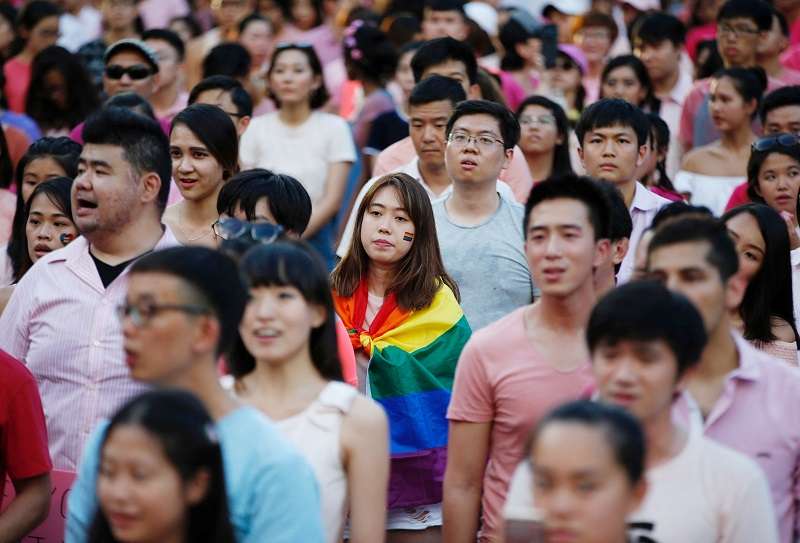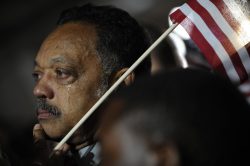
A woman wrapped in the rainbow flag is seen at the Pink Dot rally, Singapore’s annual gay pride rally, at a park in Singapore July 1, 2017.
11:23 JST, August 22, 2022
Singapore will not allow same-sex marriages even as it moves to repeal a law that criminalizes sex between gay men, Prime Minister Lee Hsien Loong announced Sunday.
The government plans to amend the country’s constitution to limit its definition of marriage to between a man and a woman, and protect that definition from court challenge.
Marital status is linked to many social policies in Singapore, including eligibility for public housing and adoption. LGBTQ activists in the Southeast Asian country have long derided this system as discriminatory, and some now fear that enshrining the definition of marriage will entrench it.
Titled “Outrages on decency,” section 377A states that sex between men is punishable by up to two years in prison.
Rights activists describe the colonial-era penal code section as archaic, discriminatory and a contributor to social stigma by branding members of the LGBTQ community as criminals.
“Section 377A relegates our gay friends and relatives to second class citizenship by signaling that what they do, and who they are, is condemnable and wrong,” reads the website for the organization Ready 4 Repeal.
Singapore’s Court of Appeals in February ruled that 377A was unenforceable – building on the decision that the law would be kept on the books but authorities would not “proactively enforce” it, as Lee said in 2007. It would have been “too divisive” to decide anything otherwise, Lee said Sunday, leaving the nation with this “untidy compromise” for years.
Still, the law occupies a major role in the public discourse over LGBTQ issues, holding strong symbolic significance for activists, many of whom had campaigned against it over generations.
“This took a whole lot of people, over decades … today we stand together to savour this moment,” Harpreet Singh, a lawyer who helped bring a constitutional challenge against 377A in 2019, told The Washington Post on Sunday.
Oogachaga, a Singaporean LGBTQ community organization, said it was “relieved and hopeful” to learn of the repeal. This can “be a chance to start healing the hurts that have taken place,” it said.
Section 377A has caused “immeasurable pain and suffering” for LGBTQ people in the country, said Jean Chong, co-founder of Sayoni, a queer rights organization in Singapore. Chong said she feels “deep regret” that the removal of the law has to come alongside added protections to the government’s definition of marriage.
“These suggested constitutional changes will discriminate against LGBTQ families and partnerships who make important contributions to Singapore’s economy and society,” Chong said.
Religious groups in Singapore, including the Roman Catholic Archdiocese of Singapore and an alliance of Christian organizations, advocated vigorously in recent weeks for the government to add protections to the traditional definition of marriage.
In a televised speech, Lee characterized the government’s two-pronged decision as a compromise that would allow the country to “maintain our current family and social norms.”
“By and large, Singapore is a traditional society, with conservative social values,” Lee said. “Hence even as we repeal 377A, we will uphold and safeguard the institution of marriage.”
Several dozen countries have legalized same-sex marriages, according to the Pew Research Center. Some of them, such as the United States and Taiwan, did so after constitutional challenges. Lee said in his speech that his government wants to avoid such challenges by amending the constitution.
The courts are not the “right forum” to decide the issue, he said. “Judges and courts have neither the expertise nor the mandate to settle political questions and rule on social norms and values – because these are fundamentally not legal problems, but political issues,” Lee added.
The constitutional change will “keep what I believe most Singaporeans still want, and that is to retain the basic family structure of marriage between a man and a woman,” he said, without elaborating on any data.
A 2022 Ipsos poll reported increasingly positive attitudes among Singaporeans toward same-sex marriages. Nearly 50 percent of all respondents said they were more accepting of same-sex relationships than they were three years ago.
Top Articles in News Services
-

Survey Shows False Election Info Perceived as True
-

Prudential Life Expected to Face Inspection over Fraud
-

Hong Kong Ex-Publisher Jimmy Lai’s Sentence Raises International Outcry as China Defends It
-

Japan’s Nikkei Stock Average Touches 58,000 as Yen, Jgbs Rally on Election Fallout (UPDATE 1)
-

Trump Names Former Federal Reserve Governor Warsh as the Next Fed Chair, Replacing Powell
JN ACCESS RANKING
-

Japan PM Takaichi’s Cabinet Resigns en Masse
-

Japan Institute to Use Domestic Commercial Optical Lattice Clock to Set Japan Standard Time
-

Israeli Ambassador to Japan Speaks about Japan’s Role in the Reconstruction of Gaza
-

Man Infected with Measles Reportedly Dined at Restaurant in Tokyo Station
-

Videos Plagiarized, Reposted with False Subtitles Claiming ‘Ryukyu Belongs to China’; Anti-China False Information Also Posted in Japan
























